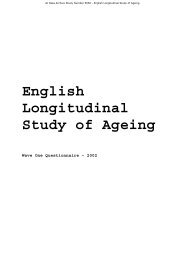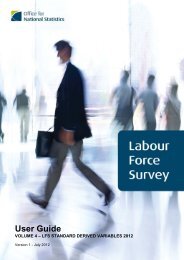The Seven Principles of Public Life - ESDS
The Seven Principles of Public Life - ESDS
The Seven Principles of Public Life - ESDS
Create successful ePaper yourself
Turn your PDF publications into a flip-book with our unique Google optimized e-Paper software.
holders, irrespective <strong>of</strong> their position, should accept a certain level <strong>of</strong> media examination <strong>of</strong><br />
their private behaviour.<br />
<strong>The</strong> fact that people consider it more important for national politicians than for appointed<br />
<strong>of</strong>ficials to set a good example in their private lives is also reflected in their views on media<br />
scrutiny. While around 75 per cent <strong>of</strong> respondents felt that national politicians should<br />
accept at least a certain level <strong>of</strong> media interest in their private lives, only around 60 per cent<br />
applied the same stipulation to appointed senior public <strong>of</strong>ficials and local councillors.<br />
On the whole people accepted that there were limits to the extent to which senior public<br />
<strong>of</strong>fice holders should expect the media to examine their private lives. However, a sizeable<br />
minority <strong>of</strong> respondents (24 per cent in the case <strong>of</strong> government ministers and 20 per cent<br />
in the case <strong>of</strong> MPs) thought that national politicians should accept that the media examine<br />
every aspect <strong>of</strong> their private lives. In relation to senior public <strong>of</strong>ficials and local councillors,<br />
these proportions fell to 13 per cent and 10 per cent respectively.<br />
Opinions on this issue were broadly similar across different sub-groups. However, young<br />
people (aged 18-24) were more likely than other age groups to advocate the right to<br />
privacy.<br />
8 <strong>Public</strong> <strong>of</strong>fice holders and accountability<br />
Although mistrust <strong>of</strong> the media – in particular the tabloid press – is relatively widespread,<br />
people nonetheless see the media as an effective channel for policing the behaviour<br />
<strong>of</strong> public <strong>of</strong>fice holders and perceive it to perform this role more successfully than<br />
<strong>of</strong>ficial activity does. Although more than half <strong>of</strong> respondents felt confident that the<br />
authorities were committed to improving standards in public life, only about 40 per cent<br />
felt confident that the authorities would either uncover or punish wrongdoing in public<br />
<strong>of</strong>fice. In contrast, 79 per cent were confident that the media would expose wrongdoing.<br />
This finding is not surprising: media activity in exposing the misdemeanours (or alleged<br />
misdemeanours) <strong>of</strong> public figures is much more visible to the general public than <strong>of</strong>ficial<br />
activity in this sphere and it seems likely that, even when <strong>of</strong>ficial activity in exposing<br />
wrongdoing is reported in the media, some people would attribute the activity itself to the<br />
media.<br />
In this context, it is encouraging that 73 per cent <strong>of</strong> respondents, when told about the<br />
type <strong>of</strong> work that the Committee does, thought that standards in public life would<br />
improve as a result <strong>of</strong> this work, albeit most <strong>of</strong> them anticipating that the gain would be<br />
minor rather than significant.<br />
12 BMRB International Report: Survey <strong>of</strong> public attitudes towards conduct in public life

















